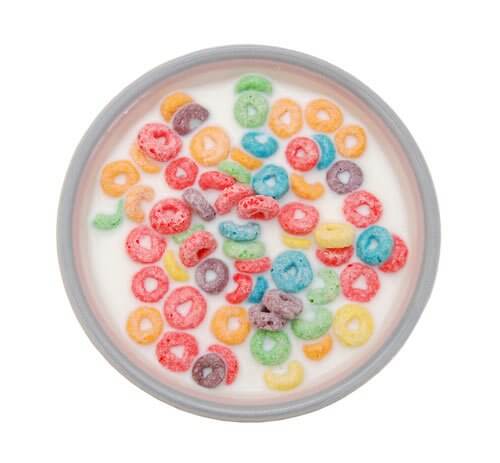Would you feed your children candy, ice cream or chocolate cake for breakfast? Most cereals are no better.
Colorful commercials love to tell us and our children that cereal is a healthy, wholesome and nutritious breakfast.
What they don’t tell us is the truth…
Many popular children’s cereals are packed with more sugar than a bowl of ice cream, a jelly donut or a slice of chocolate cake, and as much salt as a bag of potato chips. Golden Crisp and Honey Smacks contain more than 50 percent sugar, and Cap’n Crunch, Apple Jacks, Fruit Loops and Corn Pops all contain 12 grams of sugar and almost zero fiber.
And corn flakes actually cause your blood sugar to skyrocket more than pure glucose.
In contrast, a glazed donut from Dunkin’ Donuts contains 6 grams of sugar.
Donut 1, Cereal 0
When you look at the ingredients in cereal and donuts, you really don’t see much of a difference. Donuts are made from processed flour, sugar and oil. Cereal is made from processed flour, sugar and…oil. (More often, sugar is the first ingredient).
Why does that matter?
Because sugar makes you fat and sick.
Sugar also suppresses your immune system and leaches vitamins from your bones, among other nasty and terrifying things.
And how do you give yourself type 2 diabetes? By eating too much sugar and too many grains (for example, a bowl of cereal every morning).
“Yeah, but there are vitamins in cereal!”
Not real ones. Food manufacturers fortify their cereals with synthetic vitamins and minerals that the human body rarely recognizes as nutrition—and promptly expels.
“…But cereals use whole grains!”
Sure, some do. But modern grains are not particularly good for you. In fact, I recommend that my fans and followers avoid most grains if their goal is to lose fat.
Why donuts are less evil than breakfast cereal?
No one scarfs down a donut for breakfast thinking they’re doing their heart a favor. But how many people casually eat cereal as their meal or snack? I certainly used to—cereal got me through college. But I didn’t know I was eating dessert for breakfast.
When you eat a donut, you know you are indulging in a gut bomb that will make you fat. But because you ate junk in the morning, you (hopefully) compensate and do your best to avoid gut bombs for the rest of the day. On the other hand, you might have been taught to congratulate yourself when you polish off a “heart healthy” bowl of a cereal.
…But you might as well eat that donut.

On Marketing Cereal to Children
The average preschooler sees 642 cereal ads per year on TV alone. A Yale study recently found that cereals marketed to children have 85 percent more sugar, 65 percent less fiber and 60 percent more sodium than cereals advertised to adults.
Marketing unhealthy foods (or nearly anything else) to children is wrong. While adults can evaluate each product and make a purchase decision, children don’t have the BS-detecting, worldly experience needed to see through wily marketing spin.
One in three U.S. children born in 2000 will become diabetic in their lifetimes; nearly half of Hispanics and blacks are predicted to develop the disease. This is staggering…and also completely preventable. If we want to reverse this trend, it is essential that we develop guidelines that restrict advertising and marketing foods high in sugar to children.
Spokespeople for food manufacturers maintain that breakfast cereals are high in vitamins, minerals and fiber, low in fat, and have numerous health benefits.
But if you’d prefer to avoid obesity, diabetes, and other modern diet–induced ailments, then skip the Trix.
Cereal is not a health food.

